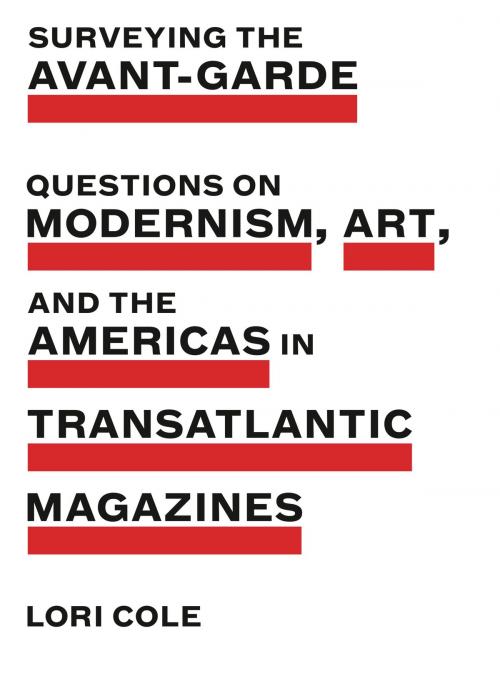Surveying the Avant-Garde
Questions on Modernism, Art, and the Americas in Transatlantic Magazines
Nonfiction, Art & Architecture, General Art, Criticism, Art History, Fiction & Literature, Literary Theory & Criticism| Author: | Lori Cole | ISBN: | 9780271081700 |
| Publisher: | Penn State University Press | Publication: | July 6, 2018 |
| Imprint: | Penn State University Press | Language: | English |
| Author: | Lori Cole |
| ISBN: | 9780271081700 |
| Publisher: | Penn State University Press |
| Publication: | July 6, 2018 |
| Imprint: | Penn State University Press |
| Language: | English |
Surveying the Avant-Garde examines the art and literature of the Americas in the early twentieth century through the lens of the questionnaire, a genre as central as the manifesto to the history of the avant-garde.
Questions such as “How do you imagine Latin America?” and “What should American art be?” issued by avant-garde magazines like Imán, a Latin American periodical based in Paris, and Cuba’s Revista de Avance demonstrate how editors, writers, and readers all grappled with the concept of “America,” particularly in relationship to Europe, and how the questionnaire became a structuring device for reflecting on their national and aesthetic identities in print. Through an analysis of these questionnaires and their responses, Lori Cole reveals how ideas like “American art,” as well as “modernism” and “avant-garde,” were debated at the very moment of their development and consolidation.
Unlike a manifesto, whose signatories align with a single polemical text, the questionnaire produces a patchwork of responses, providing a composite and sometimes fractured portrait of a community. Such responses yield a self-reflexive history of the era as told by its protagonists, which include figures such as Gertrude Stein, Alfred Stieglitz, Jean Toomer, F. T. Marinetti, Diego Rivera, and Jorge Luis Borges.
The book traces a genealogy of the genre from the Renaissance paragone, or “comparison of the arts,” through the rise of enquêtes in the late nineteenth century, up to the contemporary questionnaire, which proliferates in art magazines today. By analyzing a selection of surveys issued across the Atlantic, Cole indicates how they helped shape artists’ and writers’ understanding of themselves and their place in the world.
Derived from extensive archival research, this book reorients our understanding of modernism as both hemispheric and transatlantic by narrating how the artists and writers of the period engaged in aesthetic debates that informed and propelled print communities in Europe, the United States, and Latin America. Scholars of modernism and the avant-garde will welcome Cole’s original and compellingly crafted work.
Surveying the Avant-Garde examines the art and literature of the Americas in the early twentieth century through the lens of the questionnaire, a genre as central as the manifesto to the history of the avant-garde.
Questions such as “How do you imagine Latin America?” and “What should American art be?” issued by avant-garde magazines like Imán, a Latin American periodical based in Paris, and Cuba’s Revista de Avance demonstrate how editors, writers, and readers all grappled with the concept of “America,” particularly in relationship to Europe, and how the questionnaire became a structuring device for reflecting on their national and aesthetic identities in print. Through an analysis of these questionnaires and their responses, Lori Cole reveals how ideas like “American art,” as well as “modernism” and “avant-garde,” were debated at the very moment of their development and consolidation.
Unlike a manifesto, whose signatories align with a single polemical text, the questionnaire produces a patchwork of responses, providing a composite and sometimes fractured portrait of a community. Such responses yield a self-reflexive history of the era as told by its protagonists, which include figures such as Gertrude Stein, Alfred Stieglitz, Jean Toomer, F. T. Marinetti, Diego Rivera, and Jorge Luis Borges.
The book traces a genealogy of the genre from the Renaissance paragone, or “comparison of the arts,” through the rise of enquêtes in the late nineteenth century, up to the contemporary questionnaire, which proliferates in art magazines today. By analyzing a selection of surveys issued across the Atlantic, Cole indicates how they helped shape artists’ and writers’ understanding of themselves and their place in the world.
Derived from extensive archival research, this book reorients our understanding of modernism as both hemispheric and transatlantic by narrating how the artists and writers of the period engaged in aesthetic debates that informed and propelled print communities in Europe, the United States, and Latin America. Scholars of modernism and the avant-garde will welcome Cole’s original and compellingly crafted work.















